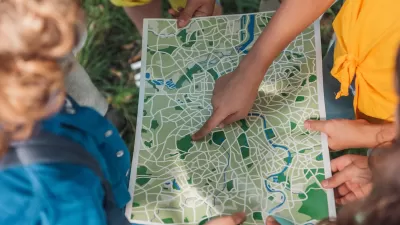Sarah Goodyear discovers a project to help Brooklynites reclaim land owned by the city, but long since abandoned, and building neighborhood bonds in the process.
When lawyer Paula Z. Segal began investigating a vacant tract of land near her home last year, she set the wheels in motion for a project that would span the entirety of Brooklyn and create the potential for a vast expanse of new public space.
The lot, she discovered, had been taken over by the city's Department of Environmental Protection some years prior to provide access for a public works project, long since completed. But in the course of her research, she discovered that this lot was not alone – there are 596 acres of such government-owned, unoccupied parcels throughout the borough, almost three-quarters the size of Central Park.
And so, she and a handful of volunteers came together to form the aptly-named 596 Acres, a project devoted to identifying these vacant lots and giving the community the tools they need to take them back.
"596 Acres helps people to navigate bureaucracy, governance structures, and neighborhood dynamics," Goodyear writes. "The group has printed a broadsheet with a flowchart that outlines the complicated processes involved without making it all seems hopelessly intimidating."
While the organization strongly advocates the creation of community gardens, their objective is ultimately to undo the blight caused by visibly underutilized open spaces. "We want to see people being able to regain control over what's going on in their neighborhoods," says Segal.
FULL STORY: No vacancy: Unleashing the potential of empty urban land

Alabama: Trump Terminates Settlements for Black Communities Harmed By Raw Sewage
Trump deemed the landmark civil rights agreement “illegal DEI and environmental justice policy.”

Planetizen Federal Action Tracker
A weekly monitor of how Trump’s orders and actions are impacting planners and planning in America.

How Atlanta Built 7,000 Housing Units in 3 Years
The city’s comprehensive, neighborhood-focused housing strategy focuses on identifying properties and land that can be repurposed for housing and encouraging development in underserved neighborhoods.

Report: Zoning Reforms Should Complement Nashville’s Ambitious Transit Plan
Without reform, restrictive zoning codes will limit the impact of the city’s planned transit expansion and could exclude some of the residents who depend on transit the most.

Judge Orders Release of Frozen IRA, IIJA Funding
The decision is a victory for environmental groups who charged that freezing funds for critical infrastructure and disaster response programs caused “real and irreparable harm” to communities.

‘Clybourne Park’ Sets Stage for Housing Equity Discussions
Clybourne Park, a play exploring race, real estate, and community tensions, can set the stage for discussion on the lasting impacts of housing discrimination, gentrification, and the fight for affordability.
Urban Design for Planners 1: Software Tools
This six-course series explores essential urban design concepts using open source software and equips planners with the tools they need to participate fully in the urban design process.
Planning for Universal Design
Learn the tools for implementing Universal Design in planning regulations.
Caltrans
Smith Gee Studio
Institute for Housing and Urban Development Studies (IHS)
City of Grandview
Harvard GSD Executive Education
Toledo-Lucas County Plan Commissions
Salt Lake City
NYU Wagner Graduate School of Public Service





























